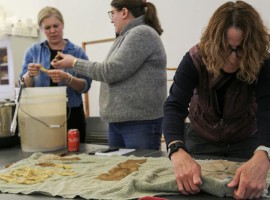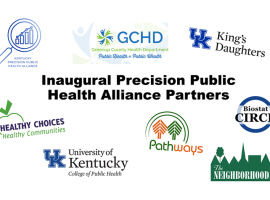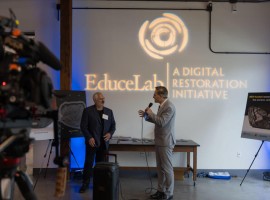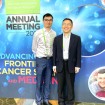Training Kentucky Students in Cancer Research to Impact Communities
This Saturday student researchers in the Markey Cancer Center’s Appalachian Career Training in Oncology (ACTION) program will be recognized on Kroger field. The ACTION program reveals how the University of Kentucky, as a research-intensive university, can help students see what’s possible in their own careers and inspire them to impact their communities.
ACTION offers undergraduates and high schoolers the opportunity to gain cancer research, clinical, outreach and educational experiences in an effort to enrich their interest in a cancer-focused career.
While ACTION has existed for UK undergrads for three years, 2019 was the first year that the program was offered to Kentucky high school students. Twenty high school students from across Eastern Kentucky were selected for the two-year program.
“When we went out to recruit for the program, we really hit hard the message of the needs of Eastern Kentucky,” said Nathan Vanderford, director for the ACTION program. “Kentucky is number one in overall cancer incidence and mortality, and those rates are highest in Eastern Kentucky. That region also has the highest rates of many other health issues, low socioeconomic status, and low education attainment. This program is really geared toward addressing all these needs and preparing students to be change agents in their communities now and in the future.”
“The high school students basically do all of the things that the undergraduates in the program do,” said Chris Prichard, ACTION program coordinator. “The main difference is the summer component for the high school students.”
The ACTION Summer Residential Program, where the students come to UK’s campus to stay for five weeks, not only introduces them to cancer research and clinical oncology, but also to life in college, ultimately preparing them for life away from home.
“I think that will be critical in terms of them going to college and being successful,” said Vanderford. “Knowing that they can handle those first couple weeks can be so critical in a college student’s life in terms of acclimating to the environment.”
During their stay on campus, the students worked one-on-one with faculty research mentors, attended workshops specifically centered around cancer and oncology, research ethics and career college readiness. Throughout the program, they return to UK’s campus once a month for ongoing education in these areas.
Outside of the residential camp and campus visits, students are encouraged to bring their research and knowledge of cancer back to their communities to incorporate lifestyle changes and behaviors that can help prevent cancer. The program encourages each student to plan at least one community outreach event per year that could focus on activities like cancer screenings or promoting general cancer awareness.
With the success of the ACTION program in undergraduates—many of whom went on to publish scholarly articles, attend national conferences and meetings, and host successful outreach events—Vanderford thought it would be a great idea to recruit high school students.
“When you’re in high school, you’re at a ripe age for soaking in all this information and really starting to get excited about it and energized about the opportunities,” Vanderford said. “The more you know about the opportunities, the more that you’ll be able to prepare specifically for whatever it is you want to pursue as a long-term career.”
Listen to the podcast with Vanderford and Prichard to learn more about the ACTION program and watch the student video: https://www.research.uky.edu/news/markeys-action-program-hosts-inaugural-summer-residential-program.
Alicia Gregory: Today we learn about the Appalachian Career Training in Oncology Program, or ACTION. Chris Prichard and Nathan Vanderford talk about the application process, workshops, mentors, living on campus, and the future of this program for high school students.
CHRIS PRICHARD: My name is Chris Prichard, and I am the program coordinator for the Appalachian Career Training and Oncology program, which is ACTION for short.
NATHAN VANDERFORD: Nathan Vanderford, I'm the assistant director for research in the Cancer Center and the director of the Appalachian Career Training in Oncology program. This program started in 2016 with undergraduates. We started engaging eight per year and have continued that since 2016. And I've seen the undergraduates do really remarkable things in terms of publish papers, go to national meetings, do some really fantastic outreach events. And so we had an opportunity with a new grant from the National Cancer Institute to expand to high school students.
CHRIS PRICHARD: So the high school students basically do all of the things that the undergraduates in the program do, as well. So the high school students, like the undergraduates, are paired with different labs across campus, where they can observe and work. The high school students get to observe in the operating room, like the undergraduates as well. All of our students get paid a monthly stipend for their participation. The program is still a two-year program, both for the undergraduates and the high school students. The main difference is the summer component for the high school students.
CHRIS PRICHARD: So each summer, they will spend five weeks with us on campus, but during the academic year, from August through May, they will return to campus once a month on a Saturday and participate in different workshops here on campus. Additionally, though, they will come up with outreach projects for their home communities. So it may be fundraising for specific kinds of cancer, like breast cancer awareness and things like that. But mostly, it is just the students educating the people in the community about cancer, the causes of cancer, treatments, the importance of checkups, getting them to hopefully stop smoking and do some of those things that add to the cancer burden here in our state.
NATHAN VANDERFORD: I think as a high school student, you're really starting to really think about kind of what you want to do. And I think it's critical more so now than maybe ever before to begin preparing for what you want to do in the long term as early as possible. So high school, you’re really, you're at a ripe age for soaking in all this information and really starting to get really excited about it and energized about the opportunities. And the more you know about the opportunities, the more that you'll be able to prepare specifically for whatever it is you want to pursue as a long-term career.
NATHAN VANDERFORD: When we went out to recruit for the program, we really hit hard the message of the needs of Kentucky and particularly the needs of Eastern Kentucky. So as many know, Kentucky is number one in overall cancer incidence and mortality, and those rates are highest in Eastern Kentucky. And then that region also has the highest rates of many other health issues, low socioeconomic status, low education attainment. So we pitched the idea that this program is really geared toward addressing all these needs, providing an educational opportunity for students to really focus on oncology as a career path, and then using that as change agents in the community now and in the future as they pursue an oncology career and have an impact directly on their community.
CHRIS PRICHARD: This group of students, in particular, has far exceeded, I think, our expectations for the program. You know, there were 91 applicants, and we chose the top 20 from those applicants. And I don't think if we had handpicked every one after an interview process that we couldn't have picked a better group. They're so eager to learn, and they are retaining the knowledge.
CHRIS PRICHARD: So the application process was a simple one, and we did that on purpose, because we wanted lots of applicants. The application itself was very short, asked for demographic information, got permission from parents or guardians for them to apply and participate if they would be selected. We didn't look particularly at GPA or test scores. We looked at need of students based on if they were from low-income families, if they were going to be first-generation college students, if they were from an underrepresented minority, if they were female or otherwise, in some way, underrepresented. And then their essay that they had to write, basically was why they wanted to be in the program, why they should be chosen to be in the program maybe over someone else, why they were interested in the field of oncology, and what that might look for them in the future.
CHRIS PRICHARD: So there's a series of workshops specifically centered around learning about cancer and oncology. There's an ethics and health care workshop that they participate in. And then there are college and career readiness workshops that they work through as well.
NATHAN VANDERFORD: We're doing a cancer focus workshop and ethics focus workshop, a career college readiness workshop. And all these are really geared toward helping them better understand cancer or cancer research, cancer clinical care. And ethics is really a foundational principle of everything that we do, especially in terms of research and clinical practice. So it's really, really critical to have a good, strong foundation of ethical principles that can guide us in doing our research correctly and caring for our patients correctly. So it's a critical workshop. And I think it's interesting because I think that workshop has had a really big impact on these students. They've watched videos of the Henrietta Lacks story, about the Tuskegee experiment. And these are things that they've never heard of before and they're learning about past mistakes and how we've learned from those and how we can change the way we do things for the better and do better research and do better clinical practice.
NATHAN VANDERFORD: So we have really fantastic mentors here at the university. Across the university, I'm always amazed every year at the outstanding teachers, faculty, that we have here. And that goes for in the classroom and mentors, just career advising, but then also particularly for research mentoring. So it isn't hard to convince faculty to, really, they're already passionate about doing this. They work with graduate students, undergraduates, all the time. And they realize the power that they can have in providing a transformational experience to high school students, as well. So they're very willing to do this. And they're excited, just like we are, about seeing these students transform over a pretty short amount of time in their understanding of cancer and career opportunities that are available. So it's just a transformational time period in these students' lives. And you can almost every day see light bulbs go off in these students' heads. And that's a really magical experience, I think, for us as teachers and mentors.
NATHAN VANDERFORD: So when the program's over, they will have been here five weeks. And many of them have stayed the full five weeks, going home over the 4th of July period, but otherwise staying here. And so they've really gotten to experience some of college life. And I think that that will be critical in terms of them going to college and being successful and knowing that they can handle those first couple weeks that can be so critical in a college student's life in terms of acclimating to the environment. And I think that particularly for students from rural areas, I think it's really important to provide these kinds of opportunities that they can come and experience such an educational opportunity that they would never have in their home communities.
NATHAN VANDERFORD: I'll also say that sort of the cohort experience, so there's been a lot in the education realm about the power of a cohort. But most of these students never knew each other before. And so it's been fantastic to see them grow together, form bonds together. And even our RAs, one was in my office this morning and said, “You know, I never expected to grow so close to these students. And to really think about them not being here in a couple of weeks makes me sad.” And so I think that speaks volumes in terms of the relationships that are built among the students and the RAs and us as staff of the program. We become a little family. And so we experience the ups and the downs through these five weeks. And we'll continue to do that. And we'll be there to support each other and see each other succeed and be there for each other when things go wrong. I think it's a great support system.
CHRIS PRICHARD: The students have learned, I think, a lot as far as what careers might be available to them and different majors, especially if they choose to come here as undergraduates. Some of them started thinking they were going to be nurses and doctors, and that's kind of as far as it went, because that's all they knew. Now they know you can get into social work and psychology and all these different things that are part of a cancer care team, that maybe don't necessarily involve being in the operating room as a surgeon or maybe practicing as a family physician, that there are so many other avenues that they can take.
NATHAN VANDERFORD: Well, in terms of further expansion beyond engaging students, there's a significant opportunity to engage more of the students' families, particularly around cancer prevention and control topics, cancer literacy, enhancing people's understanding of cancer, doing that also more broadly in the community. I'm also really excited about an opportunity that we could do more partnerships with schools, with the students' schools, in terms of cancer awareness, cancer education, perhaps engage specifically teachers in those schools in a program. So this grant that we have, you can engage teachers, faculty in schools. There's an opportunity we could do that and bring them here and better equip them for teaching students about cancer in their classrooms. So there's lots and lots of opportunities and it's really exciting, because we could really further have an impact on getting more awareness about cancer out there. And the more people are aware, the more likelihood that they'll have in terms of changing behaviors that could reduce cancer risk.





